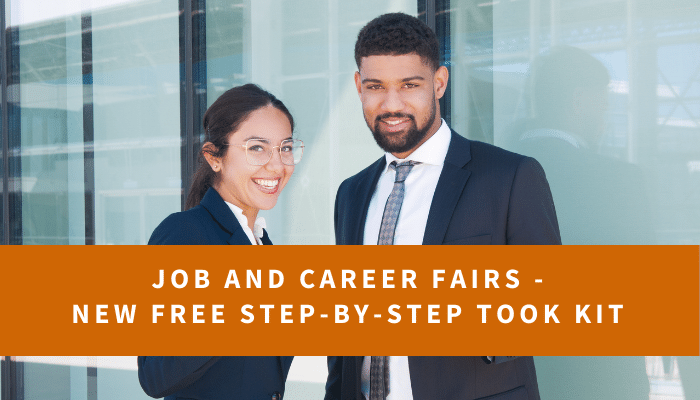Have you ever said any of these about job or career fairs?
- ”Job or Career Fairs are a waste of time.”
- “I’ll just walk around to learn.”
- “I’m an introvert, so I’d rather have a root canal.”
- “Companies don’t hire from here.”
- “Nobody gets offers at these things.”
- “They don’t have jobs I want.”
My career coaching advice is that job seekers need to do a better job and work harder to get employment results. Job seekers need to be more accountable to do more preparation, have more engagement at the event, and do tons of follow up afterward. Anything less is probably a waste of your time and won’t get you the job.
At the end of this article is a link to EVERYTHING you need to do to effectively job search at job or career fairs, step by step.
5 principles you need to know:
- Virtual career fairs are here to stay, and they are excellent forums. They open up attendance to a broad set of candidates who could not attend face-to-face. More companies can attend because they do not have to travel. Virtual fairs provide job seekers the opportunity to learn about each company well before the event.
- There is no significant difference in your preparation for a virtual career fair vs. a face-to-face one. You just don’t need to print resumes or have a home-printed business card. That’s all.
- There is a direct correlation between the job opportunities that you get from job fairs and the amount of disciplined effort you put in before, during, and after the event. There are no shortcuts.
- Employers size up candidates quickly based on first impressions. They are watching you! So, always be at your very best. Remember that everything you write, say, and look matters.
- I have walked around many job/career fairs and have surveyed hundreds of company representatives (mostly recruiters) who attend. They are underwhelmed generally with the questions they get asked and the conversations they host. Included in the toolkit are important things NOT to say to recruiters.
YOUR MISSION: Maximize your results by doing work before, during, and after the job or career fair.
There are three doors for job seekers to walk through that lead to positive results at job and career fairs: before the event, during the event, and after the event. If job seekers open these three doors, they will be more prepared, more engaged, and able to follow up. The purpose of each door is different, and successfully navigating these doors will lead to job opportunities.
- Door #1 is all about research, preparation, and setting your schedule in motion for the upcoming event.
- Door #2, during the event, your strategy is to learn, to network, and to get names.
- Finally, Door #3 is where you’re going to be applying for jobs after the event. You will follow up with everybody you met, and then following up again three times, spaced out weekly.
Job seekers, there are no shortcuts. Every door matters and your form must be excellent as you go through each door and all the steps.
Two things to do:
- Download your free Job/Career Fair toolkit here.
- Forward this article and link to anyone and everyone who may attend a job or career fair and wants results. (If they keep saying job/career fairs are worthless, don’t bother them.)
We would love to hear your success stories, so please connect with us anywhere (LinkedIn, Instagram, YouTube, my website) and tell us how our Job/Career Fair Toolkit changed your experience. Everything stays confidential.
Find other relevant insights here:
- No One Will Ask You For Your “Elevator Pitch”
- Do Your Homework for a Video Job Interview (or a video meeting at a virtual job fair)
- Face-to-Face Networking



